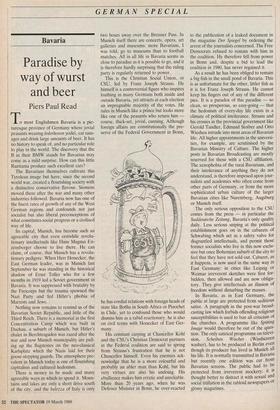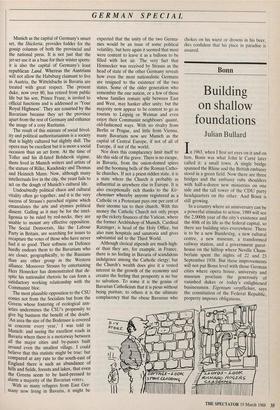GERMAN SPECIAL Bavaria
Paradise by way of wurst and beer
Piers Paul Read
To most Englishmen Bavaria is a pic- turesque province of Germany where jovial peasants wearing lederhosen yodel, eat saus- ages and drink large amounts of beer. It has no history to speak of, and no particular role to play in the world. The discovery that the B in their BMW stands for Bavarian may come as a mild surprise. How can this little Ruritania produce such excellent cars?
The Bavarians themselves cultivate this Tyrolean image but have, since the second world war, created a flourishing society with a distinctive conservative flavour. Siemens moved there after the war and many other industries followed. Bavaria now has one of the finest rates of growth of any of the West German regions and confounds not just socialist but also liberal preconceptions of what constitutes social progress or a civilised way of life.
Its capital, Munich, has become such an agreeable city that even erstwhile revolu- tionary intellectuals like Hans Magnus En- zensberger choose to live there. He can claim, of course, that Munich has a revolu- tionary pedigree. When Herr Honecker, the East German leader, was in Munich last September he was standing in the historical shadow of Ernst Toiler who for a few months in 1919 led a Soviet government in Bavaria. It was suppressed with brutality by the Freicorps but the trauma spawned the Nazi Party and fed Hitler's phobia of Marxists and Jews.
Nothing now remains to remind us of the Bavarian Soviet Republic, and little of the Third Reich. There is a memorial in the first Concentration Camp which was built in Dachau, a suburb of Munich, but Hitler's chalet in Berchtesgaden was razed after the war and now Munich municipality are pull- ing up the flagstones on the neo-classical Karlsplatz which the Nazis laid for their goose-stepping guards. The atmosphere pre- valent in Munich today is one of flourishing capitalism and cultured hedonism.
There is money to be made and many agreeable ways in which to spend it. Moun- tains and lakes are only a short drive south of the city, and the belezza of Italy is only two hours away over the Brenner Pass. In Munich itself there are concerts, opera, art galleries and museums: more Bavarians, I was told, go to museums than to football matches. All in all life in Bavaria seems as close to paradise as it is possible to go, and it is therefore hardly surprising that the ruling party is regularly returned to power.
This is the Christian Social Union, or CSU, led by Franz Joseph Strauss. He himself is a controversial figure who inspires loathing in many Germans both inside and outside Bavaria, yet attracts at each election an impregnable majority of the votes. He rules in Munich like a prince but looks more like one of the peasants who return him coarse, thick-set, jovial, cunning. Although foreign affairs are constitutionally the pre- serve of the Federal Government in Bonn, he has cordial relations with foreign heads of state like Botha in South Africa or Pinochet in Chile, yet to confound those who would dismiss him as a rabid reactionary, he is also on civil terms with Honecker of East Ger- many.
His constant carping at Chancellor Kohl and the CSU's Christian Democrat partners in the Federal coalition are said to spring from Strauss's frustration that he is not Chancellor himself. Even his enemies ack- nowledge that he is a more colourful and probably an abler man than Kohl, but his very virtues are also his undoing. His ebullience makes him erratic and unreliable. More than 20 years ago, when he was Defence Minister in Bonn, he over-reacted to the publication of a leaked document in the magazine Der Spiegel by ordering the arrest of the journalists concerned. The Free Democrats refused to remain with him in the coalition. He therefore fell from power in Bonn and, despite a bid to lead the coalition in 1980, has never regained it.
As a result he has been obliged to remain a big fish in the small pond of Bavaria. This is as unfortunate for the other, littler fish as it is for Franz Joseph Strauss. He cannot keep his fingers out of any of the different pies. It is a paradox of this paradise — so clean, so prosperous, so easy-going — that the hedonism of every-day life exists in a climate of political intolerance. Strauss and his cronies in the provincial government like Gerold Tandler, Edmund Stoiber and Otto Wiesheu intrude into most areas of Bavarian life. All higher appointments in the universi- ties, for example, are scrutinised by the Bavarian Ministry of Culture. The higher posts in Bavarian Broadcasting are mostly reserved for those with a CSU affiliation. The xenophobia of the rural Bavarians, and their intolerance of anything they do not understand, is therefore imposed upon jour- nalists and academics who often come from other parts of Germany, or from the more sophisticated urban culture of the larger Bavarian cities like Nuremberg, Augsburg or Munich itself.
The only serious opposition to the CSU comes from the press — in particular the Suddeutsche Zeitung, Bavaria's only quality daily. Less serious sniping at the political establishment goes on in the cabarets of Schwabing which act as a safety valve for disgruntled intellectuals, and permit those former socialists who live in this now exclu- sive but once Bohemian suburb of the city to feel that they have not sold out. Cabaret, as it happens, is now used in the same way in East Germany: in cities like Leipzig or Weimar irreverent sketches were first for- bidden, then allowed and are now obliga- tory. They give intellectuals an illusion of freedom without disturbing the masses.
In Bavaria, as in East Germany, the public at large are protected from seditious satire. A paragraph in the post-war broad- casting law which forbids offending religious susceptibilities is used to ban all criticism of the churches. A programme like Spitting Image would therefore be out of the ques- tion. The only satirical programme on televi- sion, Scheiben Wischer (Windscreen washer), has to be produced in Berlin even though its producer has lived in Munich all his life. It is normally transmitted in Bavaria but recently one edition was cut from Bavarian screens. The public had to be protected from irreverent mockery: it is thought better to distract it with sexual and social titillation in the tabloid newspapers or glossy magazines.
GERMAN SPECIAL
Munich as the capital of Germany's smart set, the Shickeria, provides fodder for the gossip columns of both the provincial and the national press. It is not just that the jet-set use it as a base for their winter sports: it is also the capital of Germany's least republican Land. Whereas the Austrians will not allow the Habsburg claimant to live in Austria, the Wittelsbachs in Bavaria are treated with great respect. The present duke, now over 80, has retired from public life but his son, Prince Franz, is invited to official functions and is addressed as 'Your Royal Highness'. They are cosseted by the Bavarians because they set the province apart from the rest of Germany and enhance the image of a cosy Ruritania. The result of this mixture of social frivol- ity and political authoritarianism is a society that is highly cultured but slightly dull. The opera may be excellent but it is more a social occasion than an art form. At the time of Toller and his ill-fated Bolshevik regime, there lived in Munich writers and artists of the stature of Rilke, Kandinsky and Thomas and Heinrich Mann. Now, although many intellectuals live in the city, the yeast fails to act on the dough of Munich's cultural life. Undoubtedly political chaos and cultural vitality often go together, and it is the very success of Strauss's parochial regime which emasculates the arts and stymies political dissent. Galling as it may be for the intel- ligensia to be ruled by red-necks, they are unable to mount any effective opposition. The Social Democrats, like the Labour Party in Britain, are searching for issues to recapture the votes of those who have never had it so good. Their softness on Defence hardly endears them to the Bavarians who are closer, geographically, to the Russians than any other group in the Western alliance. Moreover Strauss by entertaining Herr Honecker has demonstrated that de- spite his nationalist rhetoric he can form a satisfactory working relationship with the Communist bloc.
The most plausible opposition to the CSU Comes not from the Socialists but from the Greens whose fostering of ecological anx- ieties undermines the CSU's propensity to give big business the benefit of the doubt. 'An area the size of the Bodensee is covered in concrete every year,' I was told in Munich: and seeing the excellent roads in Bavaria where there is a motorway between all the major cities and by-passes built around even the smallest village, I could believe that this statistic might be true: but compared at any rate to the south-east of England there is such an abundance of hills and fields, forests and lakes, that even the Greens seem to be hard-pressed to alarm a majority of the Bavarian voters. With so many refugees from East Ger- many now living in Bavaria, it might be expected that the unity of the two Germa- nies would be an issue of some political volatility, but here again it seemed that most were content to leave it as a balloon to be filled with hot air. The very fact that Honnecker was received by Strauss as the head of state of the other Germany reveals how even the most nationalistic Germans are resigned to the existence of the two states. Some of the older generation who remember the one nation, or a few of those whose families remain split between East and West, may hanker after unity; but the majority now appear to be content to go as tourists to Leipzig or Weimar and even enjoy their Communist neighbours' quaint, old-fashioned ways. With no rivalry from Berlin or Prague, and little from Vienna, many Bavarians now see Munich as the capital of Central Europe, if not of all of Europe, if not of the world.
Nor does this complacency limit itself to life this side of the grave. There is no escape, in Bavaria, from the onion-domed spires and the booming bells of the Roman Catho- lic churches. If not a priest-ridden state, it is a state where the Church is probably as influential as anywhere else in Europe. It is also exceptionally rich thanks to the Kir- chenstuer whereby anyone registered as a Catholic or a Protestant pays one per cent of their income tax to their church. With this money the Catholic Church not only props up the rickety finances of the Vatican, where the former Archbishop of Munich, Cardinal Ratzinger, is head of the Holy Office, but also runs hospitals and sanatoria and gives substantial aid to the Third World.
Although clerical stipends are much high- er than they are, for example, in France, there is no feeling in Bavaria of scandalous indulgence among the Catholic clergy; but the Church's wealth does give it a vested interest in the growth of the economy and creates the feeling that prosperity is no bar to salvation. To some it is the genius of Bavarian Catholicism that it is pious without being puritan; to others it is the ultimate complacency that the obese Bavarian who chokes on his wurst or drowns in his beer, dies confident that his place in paradise is , assured.

























































 Previous page
Previous page